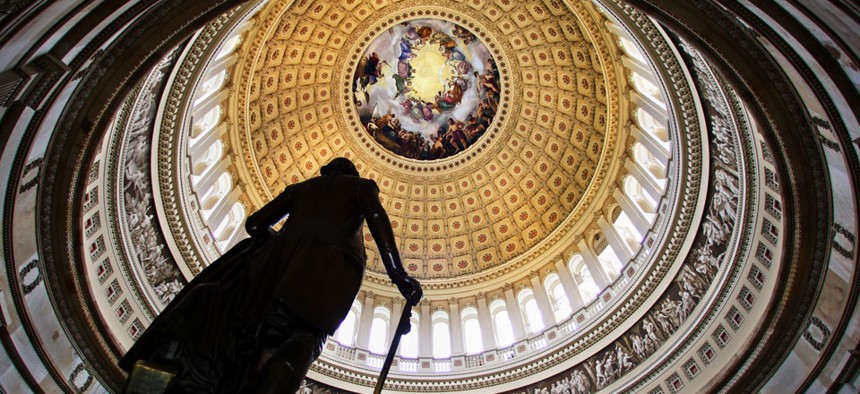Poll: Majority of Americans Say Bag Sequestration
61 percent of those surveyed would undo all or some of the automatic budget cuts.
As congressional negotiators work toward a budget deal to avoid another government shutdown, a majority of Americans appear to want some sort of agreement to be struck that would avoid triggering another round of automatic government budget cuts.
According to the most recent United Technologies/National Journal Congressional Connection Poll, a commanding majority of those surveyed, 61 percent, would undo all or some of the automatic sequester cuts, which remain the law of the land. Just 18 percent favored enacting all of the required cuts.
Should Sen. Patty Murray and Rep. Paul Ryan, who cochair the budget conference committee, fail to reach a deal before the end of the week, it's possible Congress will be forced to pass a resolution to fund the government at the spending levels called for by the sequester, which sits at $967 billion for the current fiscal year. Should they reach a deal, it could fund the government at a higher level and reverse some of the sequester cuts.
But the public remains divided on how to pay for increased spending if some of the sequester cuts are to be avoided. In fact, just 29 percent of those who oppose the automatic cuts say that the savings should come from cuts to Medicare, Medicaid, and Social Security. A solid 73 percent of those surveyed instead believe the savings should be secured by raising taxes on the wealthy by eliminating tax credits and deductions—a strategy that Republicans have rejected.
Democrats were more likely to support raising taxes on the wealthy to cover the cost of restoring the sequester cuts, with 84 percent favoring such a move. By contrast, 56 percent of Republicans endorsed that idea, but the fact that a majority of Republican respondents would favor raising revenue through eliminating tax deductions and credits may come as a surprise.
Still, the savings, the public believes, have to come from somewhere. Half of those surveyed believe undoing the cuts isn't worth it if it would grow the federal budget deficit, while 46 percent said they would be comfortable with increasing the deficit.
Not surprisingly, a large portion (72 percent) of those who favor undoing only the cuts in military spending would balance the books by slashing domestic programs, while 63 percent of those who want to see higher domestic spending levels would slice even deeper into the defense budget.
Twenty-nine percent of those surveyed said they would undo all of the sequester cuts, while just 13 percent would undo the cuts to the military only. Nineteen percent would undo just the cuts to discretionary domestic spending. Republicans were more likely to want to preserve the sequester cuts in their entirety than were Democrats (20 percent to 13 percent). And Democrats were far more likely to want to do away with them altogether, with 39 percent favoring that option, compared with just 19 percent of Republicans.
Men were more likely than women to support maintaining the sequester-level spending levels. And underscoring the messaging challenge for both Democrats and Republicans on the issue, almost one-quarter of those asked about keeping the sequester cuts at current levels responded by saying they didn't know enough to answer or simply refused to give a response.
Interviews for the United Technologies/National Journal Congressional Connection Poll were conducted by landline and cell phones with a nationally representative sample of 1,002 adults by Princeton Survey Research Associates International from Dec. 5 to Dec. 8. The margin of error for the poll was plus or minus 3.7 percentage points.




